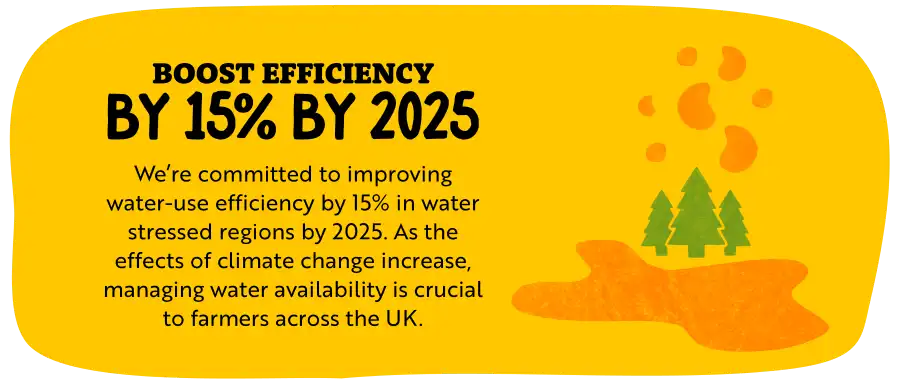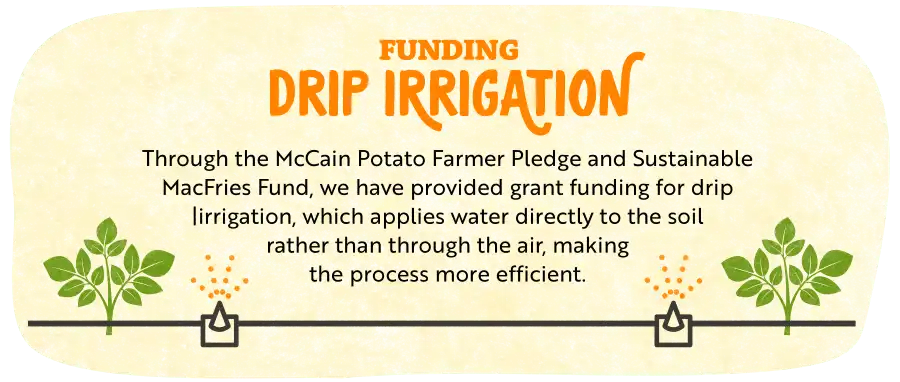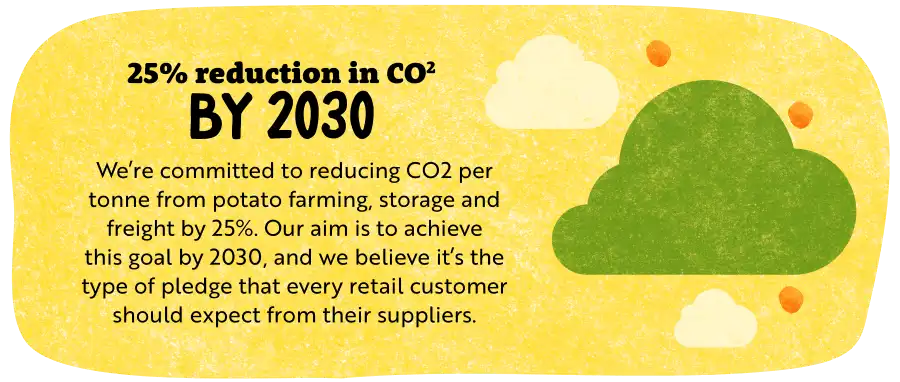SMART & SUSTAINABLE FARMING
Our Smart & Sustainable Farming pillar aims to help strengthen food and agricultural systems to support farmers in safeguarding their livelihoods
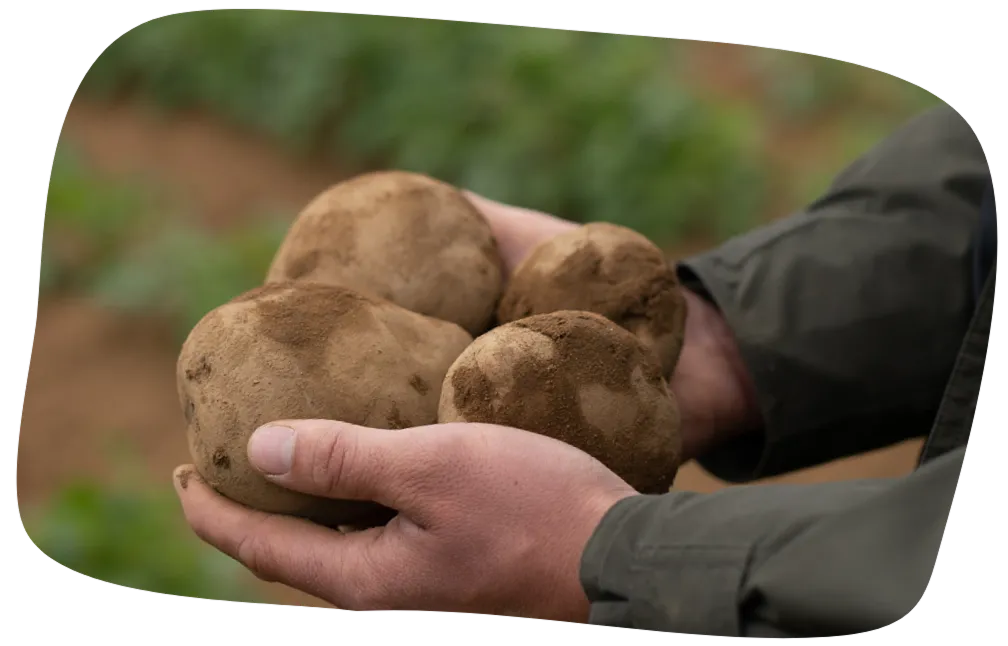
Smart and sustainable farming is at the heart of our business. We were founded by a family of farmers and today, generations later, McCain is still a family run business. We partner with farmers close to our 49 production facilities, four of which are based in Great Britain. Our global operations span six different continents, and each region works hard year after year to produce quality crops. That's why we're committed to regenerative agriculture.
Regenerative Agriculture
So, what is regenerative agriculture? We define it as an ecosystem-based approach to farming that aims to improve farmer resilience, yield, and quality by improving and restoring soil health, enhancing biodiversity, and reducing the impact of chemicals on the environment.
100%
regnerative agriculture practices implemented across our farmers' potatoes acres used to grow McCain potatoes by 2030
Our ambitious Commitment for 2030
Regenerative agriculture practices over time aim to help secure the quality and quantity of our crop into the future. And that means we aim to access a reliable supply of potatoes for our customers and consumers.
Compared to conventional farming practices, regenerative agriculture not only focuses on yield, but also supports the use of farming practices guided by the following principles:
Regenerative agriculture helps improve the climate resilience of a farm, lowers input costs, reduces greenhouse gas emissions, improves biodiversity and soil health, including increased water holding capacity and more.
To discover more about McCain’s regenerative agriculture practices Download Framework
How McCain is helping farmers navigate climate change
At McCain, we aim to make sure that our supply of quality products is resilient, especially with the unpredictability of today's climate.
To help us do that we’re:
Investing millions
In 2020 we launched the McCain Potato Farmer Pledge, a £25 million investment into British potato farming for a sustainable future for British growers, in the face of increasing climatic events like droughts and floods. Growers can apply for grants to invest in harvesting capacity and improved sustainable potato growing.
Funding Technologies
This includes grant funding which supports investment into self-propelled harvesters, irrigation, health and safety, storage capacity and sustainability.
Minimizing farm waste
To help minimize food waste on farms we take the ‘whole’ crop into our factories.
Testing thousands of potato varieties
In the UK we test tens of thousands of potato varieties. This allows us to look closely at attributes such as yield, drought resistance and overall quality.
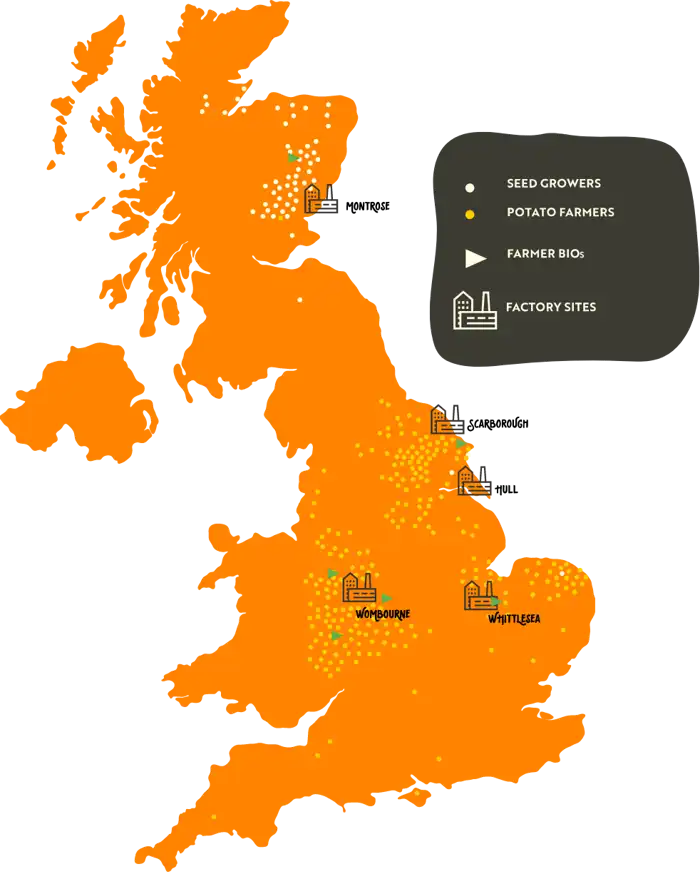
Traceability from farm to fork
As 80% of all potatoes eaten in the UK are home grown, they don’t need to travel far from the field to the plate, and this kind of local sourcing is great news for the environment. But for food retailers and consumers, local sourcing goes beyond simply decreasing emissions, it also supports hundreds of British farmers and farming communities.
When it comes to our supply chain, quality and traceability are key. 100% of our British potatoes come from certified Red Tractor growers –the UK’s leading farm and quality food production certification, that assures food safety and traceability. This includes our seed potato business in Montrose.
Potato farming and water use efficiency
Here are just some of the ways we're encouraging farmers to use water more efficiently today and in the future:
Working in partnership with our farmers
We're fully behind Great Britain's farmers. We aim to support our farmers to improve soil health, the tastier the potato they produce, the happier our hungry customers are. That's why were so committed to developing research partnerships and leveraging collective action to further improve and advance farming practices.
Our Sustainable Fries Fund was a joint two-year investment between us and McDonald's. We provided £1 million which has been used by farmers to invest in new technology, and fund research and development projects for water and soil.
We are also part of the One Planet Business for Biodiversity (OP2B) coalition, where we help to drive regenerative agriculture forward.
McCain is a member of The Sustainable Markets Initiative, which works to build a coordinated global effort to enable the private sector to accelerate the achievement of global climate, biodiversity and UN Sustainable Development Goal targets.
Within this, we are part of the Agribusiness Transition Hub, which includes companies across the food value chain, aiming to accelerate and scale the adoption of regenerative agriculture.









